Palu tsunami
SOS Alert • Central Sulawesi, Indonesia
Palu tsunami
SOS Alert • Central Sulawesi, Indonesia
Top stories
Knowledge Result
Search Results
Web results
Palu - Wikipedia
Palu is a chartered city (kota) on the Indonesian island of Sulawesi, 1,650 kilometres (1,030 miles) northeast of Jakarta, the mouth of Palu River. It is the capital ...
Palu is a chartered city (kota) on the Indonesian island of Sulawesi, 1,650 kilometres (1,030 miles) northeast of Jakarta, the mouth of Palu River. It is the capital ...
Indonesia earthquake: Hundreds dead in Palu quake and tsunami ...
11 hours ago - More than 380 people die as a powerful quake sends three-metre tsunami waves through the city of Palu.
11 hours ago - More than 380 people die as a powerful quake sends three-metre tsunami waves through the city of Palu.
Indonesia tsunami: Aftershocks rock Palu day after disaster - BBC News
Dozens remain missing, some thought to be trapped in the debris of collapsed buildings in the city ofPalu. Bodies have been lying in city streets and the injured
Dozens remain missing, some thought to be trapped in the debris of collapsed buildings in the city ofPalu. Bodies have been lying in city streets and the injured
Indonesia tsunami and earthquake: 384 dead, hundreds injured - CNN
1 hour ago - After the 7.5-magnitude earthquake hit Friday, water smashed into buildings and swept away homes in the coastal city of Palu, home to ...
1 hour ago - After the 7.5-magnitude earthquake hit Friday, water smashed into buildings and swept away homes in the coastal city of Palu, home to ...
Indonesia earthquake: Hundreds dead in Palu quake and tsunami
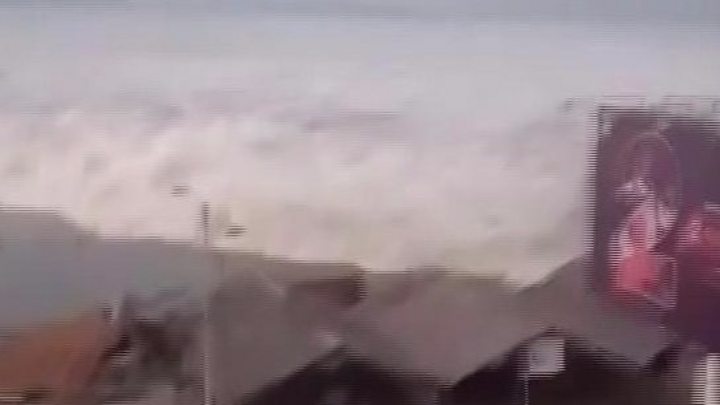
More than 380 people have been confirmed dead after a tsunami triggered by a magnitude 7.5 earthquake hit an Indonesian city on Friday.
Waves up to 3m (10ft) high swept through Palu on Sulawesi island.
Video on social media shows people screaming and fleeing in panic and a mosque among the buildings damaged.
Strong aftershocks rocked the city on Saturday. Thousands of homes have collapsed, along with hospitals, hotels and a shopping centre.
Rescue efforts are under way, though hampered by a major power cut. The main road to Palu has been blocked due to a landslide, and a key bridge is out of action.
'Many bodies along the shoreline'
Indonesia's disaster agency said at least 384 people had been killed, but the number is expected to rise. At least 540 have been injured, and 29 are listed as missing.
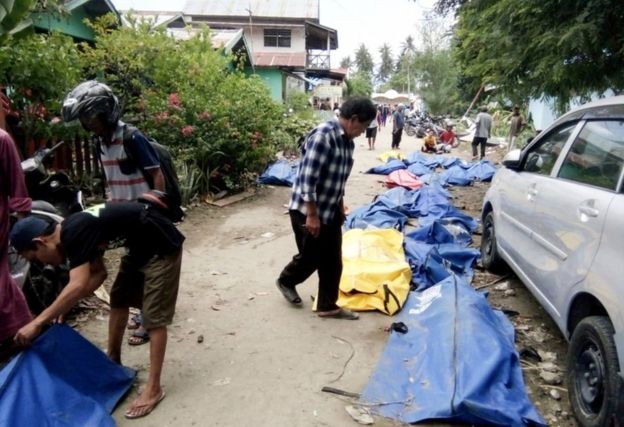 REUTERS
REUTERS
"Many bodies were found along the shoreline because of the tsunami, but the numbers are still unknown," Sutopo Purwo Nugroho, a spokesman for the agency, told Reuters.
"When the threat arose yesterday, people were still doing their activities on the beach and did not immediately run and they became victims," he told a news briefing.
"The tsunami didn't come by itself - it dragged cars, logs, houses - it hit everything on land."
Some survived by climbing 6m (18ft) trees to escape the huge waves, the spokesman said.
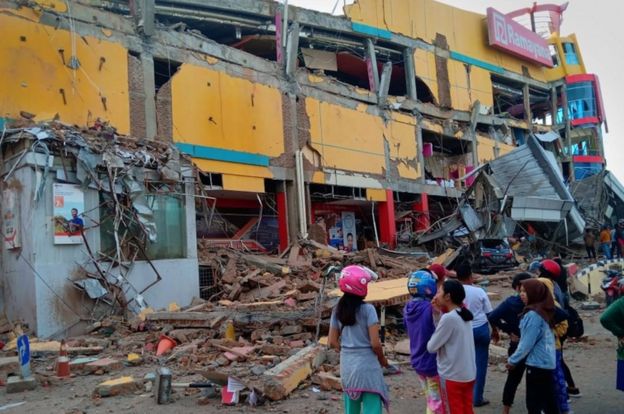 ANTARA FOTO/ROLEX MALAHA VIA REUTERS
ANTARA FOTO/ROLEX MALAHA VIA REUTERS
A less powerful quake earlier on Friday had killed at least one person and injured at least 10 in the smaller fishing town of Donggala.
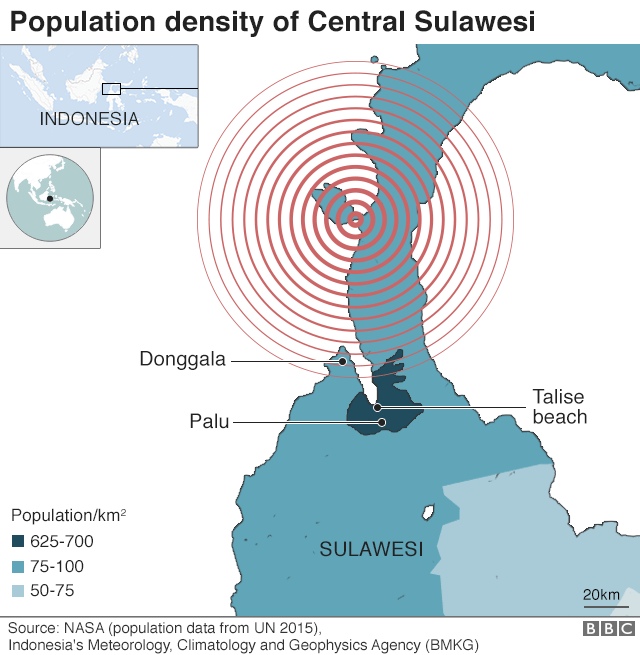
In Palu, hundreds of people had been preparing for a beach festival that was due to start on Friday night.
The city's main hospital was damaged in the quake, and TV footage showed dozens of injured people being treated outside in makeshift medical tents.
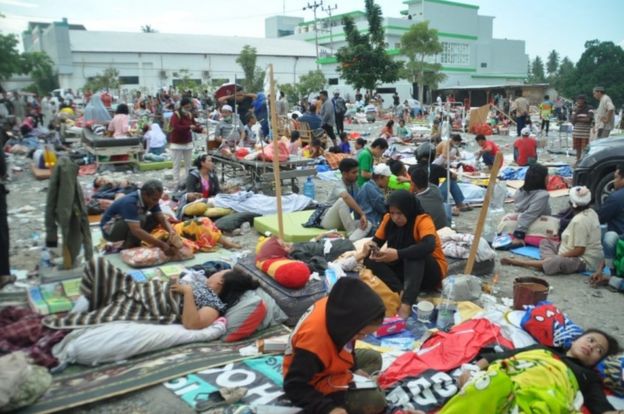 AFP/GETTY IMAGES
AFP/GETTY IMAGES
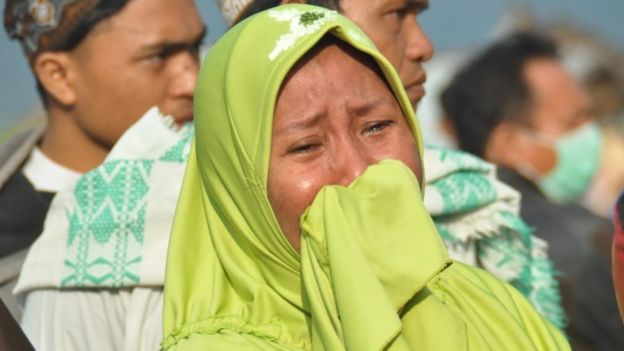 AFP
AFP
Palu and Donggala are home to more than 600,000 people. President Joko Widodo said troops were en route to the area to reinforce rescue teams and help retrieve bodies.
The main airport in Palu has been closed since the tsunami hit. A minister said the runway had been damaged but that it was hoped helicopters would still be able to land.
The country's military is sending cargo planes of relief aid from the capital, Jakarta.
Officials are urging locals not to enter their homes and to sleep away from buildings, due to the risk of aftershocks.
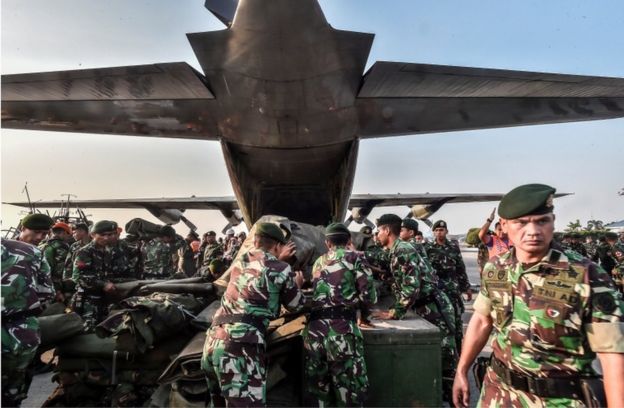 ANTARA FOTO/REUTERS
ANTARA FOTO/REUTERS
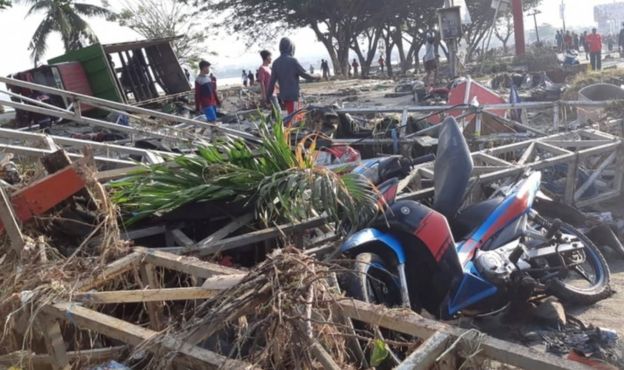 REUTERS
REUTERS
The earthquake hit just off central Sulawesi at a depth of 10km (6.2 miles) just before 18:00 on Friday (10:00 GMT), the US Geological Survey said.
A tsunami warning was issued, but lifted within the hour. Indonesia's meteorological agency has been criticised for its response, but officials said the waves struck while the warning was in place.
Dramatic video of the tsunami hitting Palu shows the high waves sweeping away several buildings and then the large tilted mosque in the town, about 80km from the quake's epicentre.
"The situation is chaotic, people are running on the streets and buildings collapsed. There is a ship washed ashore," said Dwikorita Karnawati, head of Indonesia's meteorology and geophysics agency.

A 2004 tsunami triggered by an earthquake off the Indonesian island of Sumatra killed 226,000 across the Indian Ocean, including more than 120,000 in Indonesia.
Indonesia is prone to earthquakes because it lies on the Ring of Fire - the line of frequent quakes and volcanic eruptions that circles virtually the entire Pacific rim.
More than half of the world's active volcanoes above sea level are part of the ring.
Just last month, a series of deadly earthquakes struck the Indonesian island of Lombok. The biggest, on 5 August, killed more than 460 people.
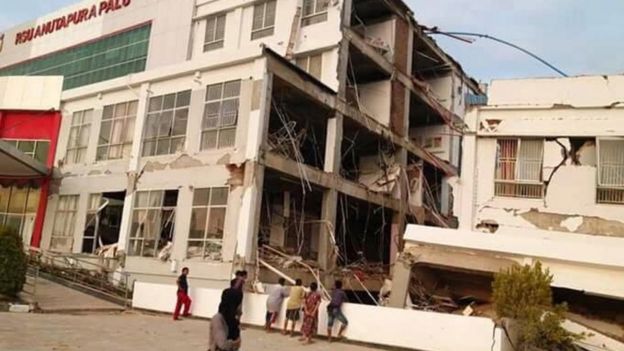 EPA
EPA
Have you been affected by the earthquake? If it is safe to do so, share your experience by emailing haveyoursay@bbc.co.uk
Please include a contact number if you are willing to speak to a BBC journalist. You can also contact us in the following ways:
- WhatsApp: +44 7555 173285
- Or Upload your pictures/video here
- Tweet: @BBC_HaveYourSay
- Send an SMS or MMS to 61124 (UK) or +44 7624 800 100 (international)
- Please read our terms & conditions and privacy policy
Or use the form below:
Asia
Aftershocks rock Indonesian tsunami zone
- 29 September 2018
- Asia
China sees surge in HIV/Aids cases
- 29 September 2018
- China
Bula! Can you trademark a greeting?
- 29 September 2018
- Asia
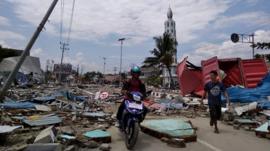









No comments:
Post a Comment